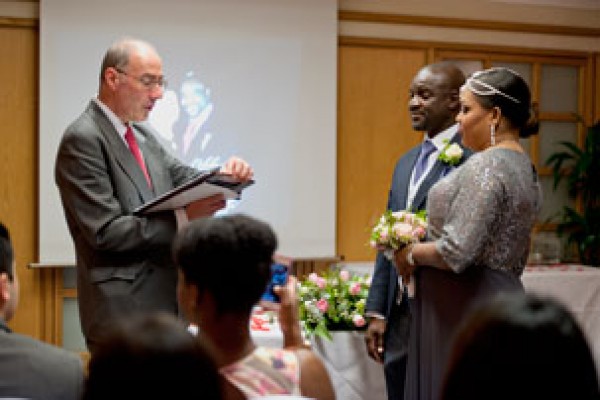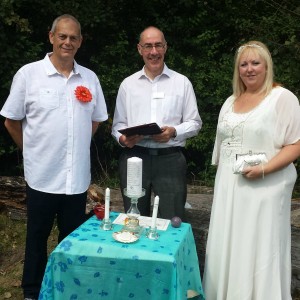by Michael | Jun 10, 2014 | Blog
As the wedding season swings into gear, it is easy to overlook certain tips that may make your wedding day that bit better.
Obviously, common sense and good manners will guide the vast majority of us very smoothly, but weddings can be a time of stress (we’re dealing with other people, after all!), and behaviour may be altered as a result.
As a civil celebrant myself, I have to point out that the celebrant should be able to play a role in smoothing the way much of the time, but not everything will be within their control!
Bride
- Ensure you don’t get rolling drunk! Apart from anything else, there will be plenty of embarrassing photographic evidence to haunt you later in life. It may also not make the best possible impression on your new relatives!
- Try and make sure you speak to all your wedding guests (they have come to see and support you).
Bridegroom
- Much of the stress in the run-up to the wedding day is borne by the bride. Do what you can, especially on the day, to share the load.
- Don’t hide away with your mates; meet and make conversation with your new wife’s friends and even relatives.
- Don’t get rolling drunk! You have a speech to deliver effectively and the comments I aimed at the bride apply to you just as much.
The bride’s mother
It is good to remember whose big day it actually is – it’s really your daughter’s. So be there early, be willing to help, but don’t criticise either other people or arrangements. This just compounds any stress being experienced.
Be prepared to play second fiddle.
The Groom’s mother
As with the bride’s mother, be supportive rather than domineering or critical. Be helpful and open and say nice things to the bride! Don’t try and get revenge for a perceived slight during the wedding planning.
The Father(s)
Just like the bride and groom, you need to be sober and in control, not least when toasting the couple’s marriage.
Don’t use the opportunity to get even with somebody who you feel has affronted you during the wedding build-up.
The Best Man
You have a huge responsibility (so it’s possibly even more important that you do not get blind drunk).
- You need to keep the groom on schedule
- You need to check the groom hasn’t forgotten anything (a check-list is a great idea)
- You will probably be responsible for the ring
- Depending on what’s been arranged, you may need to look after logistics (eg helping the photographer organise the photo shoot or liaising with the venue over certain arrangements)
- As you will presumably be delivering a major speech, remember advice I have already offered elsewhere (https://vowsthatwow.co.uk/?p=507 ). As a minimum, ensure your speech is clear, funny, inclusive, reasonably brief and in no way offensive (either personally, politically or religiously).
Maid of Honour
It’s worth having a bridal emergency kit ready on the day (safety pins, wipes, even chocolate). Reassure the bride wherever possible.
Ushers (groomsmen)
Exercise your charm when showing people to their places. At the reception, dance with single ladies (especially older ones). Be on your best behaviour (and that includes controlling your drink intake).
Bridesmaids
Ensure you are on time and ready on the day. Your job is to look beautiful and support the bride. Button up any negative criticisms you may have. Stay reasonably sober too.
Children
If children are participating, make sure they have been well briefed, that they understand their role and the behaviour that will be expected of them. If their patience is likely to be stretched during the ceremony, have somebody responsible keep an eye on them, and offer them distractions such as a book.
At the reception, there may be a children’s table and activities, but be prepared to occupy a potentially tired, bored and fractious child. And don’t get drunk out of your mind and expect others to look after your offspring!
I hope these tips will prove practical. They are the fruits of observations of potential pitfalls and pratfalls. Most of the latter can be avoided relatively easily with sense and control. Good luck!
Michael Gordon can help prepare and conduct a tailor-made civil ceremony in or around London or, indeed, in Europe.
by Michael | Jun 3, 2014 | Blog
Before I became a Civil Celebrant, I had assumed that a civil ceremony was pretty much stress-free. It was arranged well in advance, so everybody knew what they were doing.
Experience has taught me that this is not always the case!
No panic, then
As I write this, I am awaiting a call telling me whether or not I am going to be creating and conducting a wedding ceremony. That’s par for the course, you will say, especially as 400 guests are expected, so the clients are likely to be picky!
I was originally contacted about this occasion some six weeks ago. The couple then decided they would make their own arrangements and would not be using me. Fair enough. It’s going to happen occasionally.
Last weekend, they asked if I was still available. With a bit of juggling, I said I could do it.
A couple more days have elapsed with no word from them.
The point is that that ceremony will be taking place in under five days!
Writing a memorable, beautiful wedding ceremony does not happen overnight. It can surely not be left to the last minute!
Well, we’’ll see what, if anything, transpires. (Perhaps there will be an interesting follow-up blog to look forward to!)
But that mentality is evidently not just a one-off.
Another last-minute job
Last summer, the family was all ready to go off for a week’s holiday. It was a Friday morning. The suitcases were literally on the doorstep and we were making our way out when the phone rang. I wanted to ignore it, but my wife took it anyway.
Would I be available to lead a ring blessing on Saturday evening (in 8 days)?
I explained my circumstances – I was sorry, but I wouldn’t be in a position to compile something suitable from abroad. I always e-mail out drafts for clients’ approval before I conduct ceremonies, and I am passionate about delivering a professional service. I could make no guarantees in this case.
I therefore gave them contact details of another civil celebrant who might be free, and told them that I’d try and access my e-mails on holiday. If they were still desperate, they could e-mail me and I’d see what I could do on the day itself.
Off we went, and I was able to see my e-mails. Nothing of note. We got back on Friday evening and I immediately checked e-mails again. Not a word.
So the following morning I was free to go out. Returning at lunchtime, there was a message for me. Could I please call them – after 2 p.m.?
It turned out that they did still want my services – with the ceremony due to start in the small matter of five hours!
I guess I wouldn’t be writing this, if there hadn’t been a happy ending!
Suffice it to say that that short phone call gave me an idea of what was required. I couldn’t send the draft for approval (as it was to be a surprise for the wife, and their e-mail address was shared), and had to take pot luck and write what I judged would be suitable. Fortunately, they loved it and all was well!
The moral
Plan your civil ceremony well in advance and don’t rely on goodwill or chance! There might not always be a happy ending.
Michael Gordon can help prepare and conduct a tailor-made civil ceremony in or around London or, indeed, in Europe.

by Michael | Apr 8, 2014 | Blog
A number of people have challenged me recently: why consider a Vow Renewal?
I could answer: “because I’m a civil celebrant and I like them”, but I’m not sure that that’s the right sort of response!
Here are some other (hopefully, more compelling!) reasons.
Why renew vows?
34% of marriages end in divorce and 33% of them end before 10 years, so there’s every reason to celebrate staying together. People often look at 10, 15, or other multiples of 5 years as good reasons to celebrate.
You don’t need to renew your marriage just because there’s a five or zero at the end of your anniversary. People renew vows at significant moments in their lives (the birth of a baby, coming out the other side of a difficult marital patch or illness, or maybe because family and friends missed the original wedding, because it took place abroad).
What is a Vow Renewal ceremony?
Of course, the ceremony is a public declaration of love between two people. It can be in front of 200 people, or it can be a tiny, informal affair for just a handful of guests. The venue can be virtually anywhere and you have total control over how big – or small – any reception may be.
The Vow Renewal ceremonies I conduct tend to last around a quarter of an hour, although I am happy to fit in with whatever my clients request. There may be religious content or not, or a mixture. I suggest readings and poems (and, where required, prayers) that are beautiful, meaningful and memorable. However, they are all subject to the clients’ wishes.

Vows
A central point is usually the vows themselves. These can be written by the couple, and are often very moving. I always offer guidance on writing these, as many people find the prospect daunting. If they prefer it, I can suggest vows for them.
Quite often, people want their rings blessed, which is potentially a very beautiful part of the ceremony.
Check list
You’ll need to consider the following when planning your Vow Renewal:
- Venue: you don’t need to be restricted (except by budget and legality!). So you can have the ceremony in your garden, at the top of the London Eye, in a luxurious hotel, in a park or on a bridge. Or maybe at the place where you originally tied the knot.
- Invitations: you can invite whoever you want to participate in the ceremony. Maybe you have children – why not invite them to take part? The size of the guest-list is entirely down to you.
- Dress: again, up to you (although make sure you communicate your preferences to your celebrant and guests, to avoid potential embarrassment!)
- Music: you may want to use the music that you heard at your wedding; you may want a relative (preferably with a great voice!) to do a solo; you may want to play a tune that means something very special to you both – again, the choice is all yours.
- Photographer: you’ll want to capture the moment for posterity, so give some thought to hiring a good photographer (see my dedicated blog )
- Catering: even if you’re having a modest ceremony, some champagne (or equivalent) and a snack go will down well afterwards.
- Other possibilities, like dancing, may be taken into consideration too.
The Beauty of Freedom
The joy of a Vow Renewal is that you have such freedom to arrange the ceremony that you want. You can tell the world that you love your spouse and your spouse loves you. You don’t have to wait fifty years – you can do it when you’re ready. You can spend as much or as little as you want. You can involve whoever you want. It’s such a happy event.
I hope I’ve convinced you now.
Why not do it?
by Michael | Feb 18, 2014 | Blog
With just over a month until same-sex weddings can be legally conducted in England & Wales, people are increasingly likely to encounter opposition from their family. It’s therefore important to take a serious look at this issue.
The guest list
All weddings face the inevitable question: whom do you invite? It’s a tough one to answer at the best of times. You will probably start with close family and friends, but what if your closest relatives oppose your union?
Rejecting the rejectors
Do you decide to leave them out and just opt for your friends and (supportive) relations? After all, you’re likely to be spending a huge amount of money on the reception. Why should you have to accommodate people who won’t accept what you’re doing and, at worst, might even turn out to be trouble-makers?
Certainly, you’ll think twice before inviting people openly hostile to your union. On the bright side, they might decline and at least you’ll have gained kudos by having extended the olive branch!
An olive branch
Another advantage that might be gained from inviting disapproving relatives is that they might, despite their own prejudices, attend and actually enjoy a tasteful and personalized ceremony. Wouldn’t that be something if you were able to ‘convert’ them and retain – even develop – a relationship with them?!
For many of us, there is the bond of love that unites us with our families. We may not always like our relations, but to upset and potentially do without them for the rest of our lives is not always at all desirable, in truth. Giving them a chance to stay connected with you (even loosely) is worth the effort.
If the worst comes to the worst, at least you’ll know you tried. And if it brings you together, couldn’t that be precious?
Come what may, your wedding will be a commemoration of love, with promises for the future. It’s not the day to heal rifts, but it may be the pathway to do so, and that is something which should be embraced.
Michael Gordon can help prepare and conduct a tailor-made life-cycle civil ceremony in or around London or, indeed, in Europe.

by Michael | Feb 11, 2014 | Blog
Your celebrant can make or break your wedding day. Choosing the right one is therefore of paramount importance. So where do you start?
Your Ceremony
Initially, you have to decide what type of ceremony you actually want. If it’s a full religious one, you will probably hold it in your own church/synagogue/temple, etc. Then it’s relatively simple, as there is a formula for these services that just needs to be followed.
If you go for a register office wedding, the same holds true, and of course there will be no religious element whatsoever in the service. It may also come across as a bit bland.
To get the best of both worlds, you can combine register office (or religious service) and civil ceremony. For example, hold the (legal) wedding in the morning and then have the ceremony that actually fits with your dreams later in the day.

The ceremony – on the most important day of your life – should be a deeply personal experience that reflects both your and your partner’s values and style.
That’s where a civil celebrant can come in. But how do you choose the right one for you?
Find your Civil Celebrant
Unless you already know of a celebrant through a referral, say, you will probably turn to Google. You may want to look under affiliated groups (eg FOIC, British Humanist Association, etc.). People listed there will have been trained and offer minimum standards (often excellent ones, in truth). Otherwise, you might key in “Civil Celebrant Harrow” and, hopefully, Vows That Wow will appear!
Check your Celebrant out
Once you’ve found a possibility or two, you will want to look at their website. They should have testimonials, but, possibly more important, they may have a video, which will give you an idea of the sort of person they are. You will not want to work with someone you feel uncomfortable with!
First Contact – what to ask
Having settled on someone, these are things you need to find out:
- First, establish if the celebrant is free on the date you have in ind
- If so, check they are prepared to travel to conduct your ceremony
- Ask about legal requirements, as licensed premises have strict rules
- Of course, you need a quote (although trusting and liking them should be more important)
- Ask how they work – ie is there an initial meeting (where?) – and what the fee includes
- Try and get a sense of their experience, enthusiasm and character
- Check how flexible the ceremony may be (eg can you write your own vows?)
- You may want to ask about length of ceremony (although this will very much depend on your requirements)
If you feel happy that you would like this celebrant to conduct your ceremony, then your gut feeling is probably the thing to go with. However, make sure you read and understand their Terms & Conditions; there shouldn’t be any nasty surprises, especially with a bona fide professional, but it’s always as well to be vigilant.
Working with a professional will be a pleasure. You will be free to enjoy the unforgettable, unique experience that is precisely what you are looking for.
Michael Gordon can help prepare and conduct a tailor-made life-cycle civil ceremony in or around London or, indeed, in Europe.



